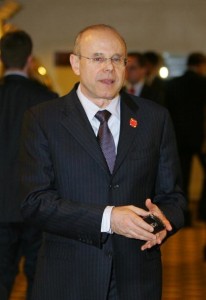

Follow us on:  
|


Finance minister Guido Mantega. [Getty Images]
“Under no hypothesis will a Brazilian government elected by free and secret vote be influenced by the opinion of a magazine that isn’t Brazilian,” Rousseff told reporters in Brasilia.
“We grew 0.6 per cent last quarter and we’ll grow more in the next one” asserted Rousseff.
The Economist, a London-based publication, insinuated that the Finance Minister of Brazil misled investors with deceptive growth forecasts, urging Rousseff to dismiss the Minister.
“The worry is that the president herself is meddler-in-chief. But she insists she is pragmatic.
“If so, she should fire Mr Mantega, whose over-optimistic forecasts have lost investors’ confidence,” said the article in the print edition of the Economist on December 8.
“In no way will I take under consideration this, shall we say, suggestion,” Rousseff responded.
The President added that inflation is under control in Brazil, and unlike Europe, the country is not suffering a sovereign debt crisis.
Brazil managed to take Britain’s spot as the world’s sixth-largest economy last year, behind the US, China, Japan, Germany and France
In 2011 GDP totalled $2.469 trillion (£1.568 trillion) in Brazil, while UK GDP was $2.420 trillion for the same year.
Brazil’s current Finance Minister has been one of the fiercest critics of the asset buying programs that Western central banks have been using to shore up their economies.
Earlier in September 2012, Mantega had warned that the US Federal Reserve’s “protectionist” move to roll out more quantitative easing will reignite the currency wars with potentially drastic consequences for the rest of the world.
The publication belongs to the Economist Group, which is half owned by the Financial Times.
The BRICS Post